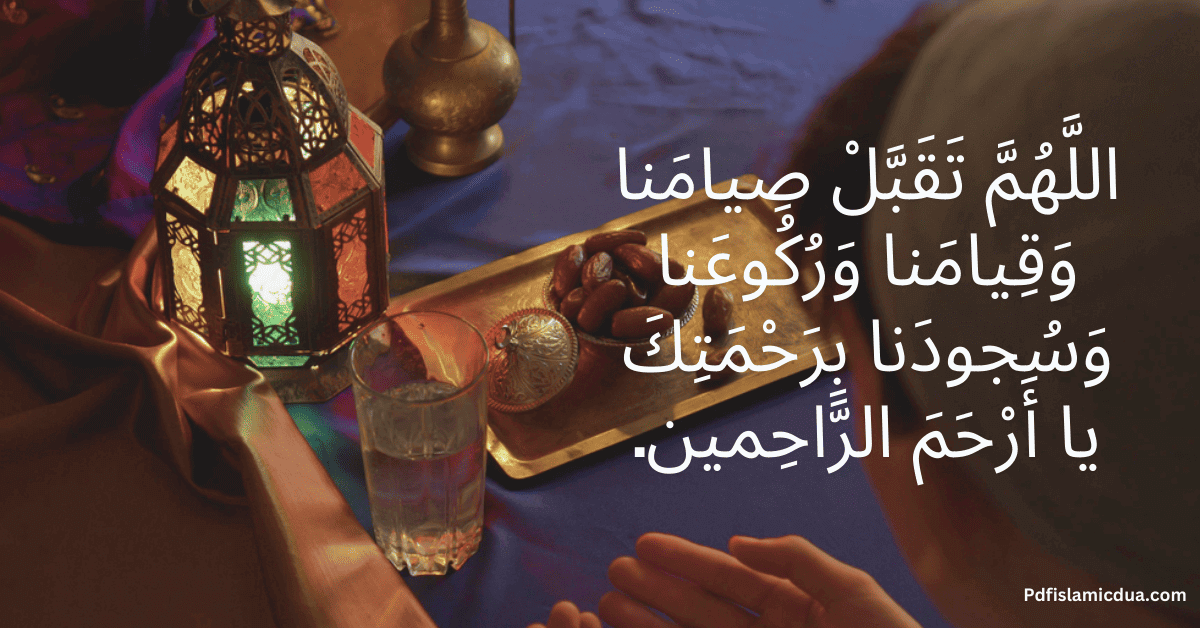Blog
Dua & Surah PDF
#allahumma taqabbal siyamana#, allah humma taqabbal siyamana, allahumma rabbana taqabbal minna shalatana, allahumma takabbal siyamana, allahumma taqabbal minna, allahumma taqabbal minna shalatana, allahumma taqabbal minna shalatana washiyamana, allahumma taqabbal seyamana, allahumma taqabbal siyamana, allahumma taqabbal siyamana wa qiyamana, rabbana taqabbal dua
pdfislamicdua
0 Comments
Allahumma Taqabbal Siyaama Full Dua with Meaning & Benefits
The dua “Allahumma Taqabbal Siyaama “ is a heartfelt Dua recited by Muslims during the holy month of Ramadan. By reciting this dua, believers ask Allah to accept their fasting as an act of sincere devotion and obedience.
This Dua reflects the hope that Allah will be pleased with one’s efforts in fasting and will reward them with His mercy, forgiveness, and blessings. The Dua underscores the importance of seeking Allah’s acceptance for acts of worship during Ramadan, a month dedicated to deepening faith and earning divine favor.
Allahumma Taqabbal Siyaama Full Dua with Meaning Full Dua with Meaning
| Arabic Text | Transliteration | Translation |
|---|---|---|
| اللَّهُمَّ تَقَبَّلْ صِيامَنا وَقِيامَنا وَرُكُوعَنا وَسُجودَنا بِرَحْمَتِكَ يا أَرْحَمَ الرَّاحِمين. | Allahumma taqabbal ṣiyāmanā wa qiyāmanā wa rukūʿanā wa sujūdanā biraḥmatika yā arḥama ar-rāḥimīn. | O Allah, accept our fasting, our prayers, our bowing, and our prostration through Your mercy, O Most Merciful of the merciful. |
Revelation
This du’a follows the Qur’an’s guidance to ask for Allah’s acceptance and to seek closeness to Him. In Surah Al-Baqarah (2:186), Allah says:
“And when My servants ask you concerning Me, indeed I am near. I respond to the invocation of the supplicant when he calls upon Me.”
It shows that while doing good deeds is important, it’s also crucial to ask Allah to accept them, reminding us to stay humble before Him.
Allahumma Taqabbal Siyaama dua’s Explanation:
Seeking Acceptance: The dua requests Allah to accept our fasts, nightly prayers, bowing, and prostrations, showing our hope for His approval and reward for our devotion and self-discipline.
Importance of Nightly Prayers: By asking for acceptance of voluntary night prayers (Tahajjud/Qiyam al-Layl), we recognize their role in strengthening our relationship with Allah and spiritual growth.
Significance of Bowing and Prostration: These physical acts (Rukoo’ and Sujood) in Salah represent humility and submission to Allah. We seek His approval of these worship actions as signs of our devotion.
Reliance on Allah’s Grace: By mentioning “by Your grace,” we acknowledge that our worship is incomplete without Allah’s mercy, relying on His kindness to accept our efforts despite any imperfections.
Appeal to Allah’s Mercy: Addressing Allah as “the Most Gracious” emphasizes our appeal to His infinite mercy and compassion, seeking His acceptance and forgiveness through His divine grace.
Benefits of the Du’a:
Hope for Mercy Despite Imperfections: This dua reminds us that Allah’s mercy is great enough to cover our mistakes. It gives us hope that He will accept our efforts, even if we’re not perfect.
Feeling Closer to Allah: By asking for Allah’s mercy, we feel more connected to Him, knowing He understands our struggles and values our sincere worship.
Humble Approach in Worship: The dua helps us remember that we don’t need to be perfect, only sincere. We seek Allah’s acceptance, which brings peace to our hearts.
Comfort from Allah’s Compassion: It reassures us that Allah, being the “Most Merciful,” is always there for us, even when we feel we aren’t good enough.
Encouragement to Keep Trying: This dua motivates us to keep worshiping and trying our best, trusting that Allah values our sincere efforts.
Seeking Forgiveness: The dua is a way of asking for Allah’s forgiveness, which helps us feel better about our mistakes, knowing He will pardon us.
When to Recite:
This du’a can be recited during:
• The last part of Ramadan, especially in the final ten nights, when prayers and fasting are most intense.
• After daily prayers (ṣalāh), or anytime during special acts of worship like Tarawih.
• Any time one is reflecting on their acts of worship and seeking Allah’s acceptance, especially at the end of long fasts or during moments of sincere devotion.
Conclusion
This du’a is a heartfelt plea for Allah to accept our acts of worship, such as fasting, prayer, bowing, and prostration, through His infinite mercy. It teaches us the importance of seeking Allah’s approval, relying on His grace, and acknowledging our need for His acceptance of our good deeds. Reciting this du’a, especially in moments of devotion, helps strengthen our connection to Allah and reminds us of the significance of humility and sincerity in worship.














Post Comment